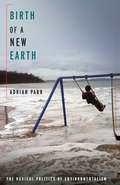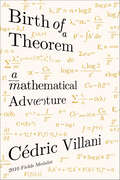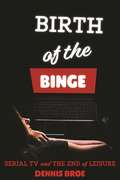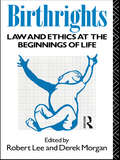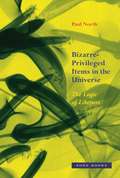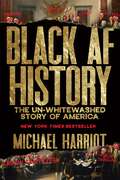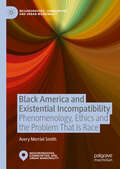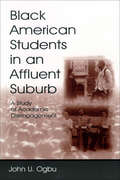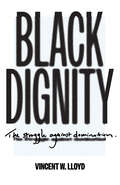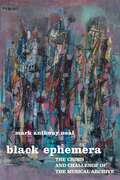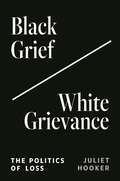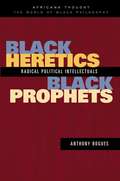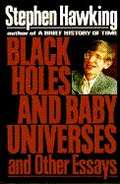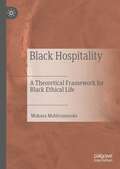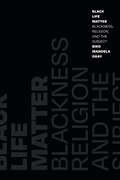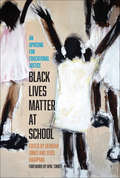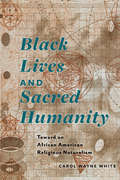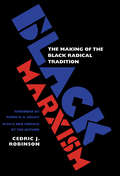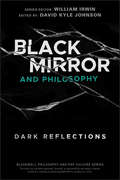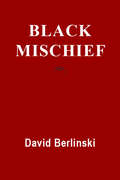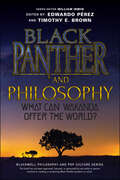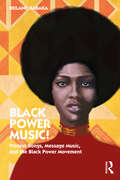- Table View
- List View
Birth of a New Earth: The Radical Politics of Environmentalism
by Adrian ParrIn response to unprecedented environmental degradation, activists and popular movements have risen up to fight the crisis of climate change and the ongoing devastation of the earth. The environmental movement has undeniably influenced even its adversaries, as the language of sustainability can be found in corporate mission statements, government policy, and national security agendas. However, the price of success has been compromise, prompting soul-searching and questioning of the politics of environmentalism. Is it a revolutionary movement that opposes the current system? Or is it reformist, changing the system by working within it?In Birth of a New Earth, Adrian Parr argues that this is a false choice, calling for a shift from an opposition between revolution and incremental change to a renewed collective imagination. Parr insists that environmental destruction is at its core a problem of democratization and decolonization. It requires reckoning with militarism, market fundamentalism, and global inequality and mobilizing an alternative political vision capable of freeing the collective imagination in order to replace an apocalyptic mindset frozen by the spectacle of violence. Birth of a New Earth locates the emancipatory work of environmental politics in solidarities that can bring together different constituencies, fusing opposing political strategies and paradigms by working both inside and outside the prevailing system. She discusses experiments in food sovereignty, collaborative natural-resource management, and public-interest design initiatives that test new models of economic democratization. Ultimately, Parr proclaims, environmental politics is the refusal to surrender life to the violence of global capitalism, corporate governance, and militarism. This defiance can serve as the source for the birth of a new earth.
Birth of a Theorem: A Mathematical Adventure
by Cédric VillaniIn 2010, French mathematician Cédric Villani received the Fields Medal, the most coveted prize in mathematics, in recognition of a proof which he devised with his close collaborator Clément Mouhot to explain one of the most surprising theories in classical physics. Birth of aTheorem is Villani's own account of the years leading up to the award. It invites readers inside the mind of a great mathematician as he wrestles with the most important work of his career.But you don't have to understand nonlinear Landau damping to love Birth of aTheorem. It doesn't simplify or overexplain; rather, it invites readers into collaboration. Villani's diaries, emails, and musings enmesh you in the process of discovery. You join him in unproductive lulls and late-night breakthroughs. You're privy to the dining-hall conversations at the world's greatest research institutions. Villani shares his favorite songs, his love of manga, and the imaginative stories he tells his children. In mathematics, as in any creative work, it is the thinker's whole life that propels discovery—and with Birth of aTheorem, Cédric Villani welcomes you into his.
Birth of the Binge: Serial TV and the End of Leisure (Contemporary Approaches to Film and Media Series)
by Dennis BroeBirth of the Binge: Serial TV and the End of Leisure describes and details serial television and "binge watching," the exceedingly popular form of contemporary television viewing that has come to dominance over the past decade. Author Dennis Broe looks at this practice of media consumption by suggesting that the history of seriality itself is a continual battleground between a more unified version of truth-telling and a more fractured form of diversion and addiction. Serial television is examined for the ways its elements (multiple characters, defined social location, and season and series arcs) are used alternately to illustrate a totality or to fragment social meaning. Broe follows his theoretical points with detailed illustrations and readings of several TV series in a variety of genres, including the systemization of work in Big Bang Theory and Silicon Valley; the social imbrications of Justified; and the contesting of masculinity in Joss Whedon’s Buffy the Vampire Slayer, Firefly, and Dollhouse. In this monograph, Broe uses the work of Bernard Stiegler to relate the growth of digital media to a new phase of capitalism called "hyperindustrialism," analyzing the show Lost as suggestive of the potential as well as the poverty and limitations of digital life. The author questions whether, in terms of mode of delivery, commercial studio structure, and narrative patterns, viewers are experiencing an entirely new moment or a (hyper)extension of the earlier network era. The Office, The Larry Sanders Show, and Orange Is the New Black are examined as examples of, respectively, network, cable, and online series with structure that is more consistent than disruptive. Finally, Broe examines three series by J. J. Abrams—Revolution, Believe, and 11.22.63—which employ the techniques and devices of serial television to criticize a rightward, neo-conservative drift in the American empire, noting that none of the series were able to endure in an increasingly conservative climate. The book also functions as a reference work, featuring an appendix of "100 Seminal Serial Series" and a supplementary index that television fans and media students and scholars will utilize in and out of the classroom.
Birthrights: Law and Ethics at the Beginnings of Life
by Robert Lee Derek MorganFirst published in 2004. Routledge is an imprint of Taylor & Francis, an informa company.
Bizarre-Privileged Items in the Universe: The Logic of Likeness
by Professor Paul NorthAn imaginative new theory of likeness that ranges widely across history and subjects, from physics and evolution to psychology, language, and artA butterfly is like another butterfly. A butterfly is also like a leaf and at the same time like a paper airplane, an owl’s face, a scholar flying from book to book. The most disparate things approach one another in a butterfly, the sort of dense nodule of likeness that Roger Caillois once proposed calling a “bizarre-privileged item.” In response, critical theorist Paul North proposes a spiritual exercise: imagine a universe made up solely of likenesses. There are no things, only traits acting according to the law of series, here and there a thick overlap that appears “bizarre.”Centuries of thought have fixated on the concept of difference. This book offers a theory that begins from likeness, where, at any instant, a vast array of series proliferates and remote regions come into contact. Bizarre-Privileged Items in the Universe follows likenesses as they traverse physics and the physical universe; evolution and evolutionary theory; psychology and the psyche; sociality, language, and art. Divergent sources from an eccentric history help give shape to a new trans-science, “homeotics.”
Black AF History: The Un-Whitewashed Story of America
by Michael HarriotNEW YORK TIMES BESTSELLER From acclaimed columnist and political commentator Michael Harriot, a searingly smart and bitingly hilarious retelling of American history that corrects the record and showcases the perspectives and experiences of Black Americans.America’s backstory is a whitewashed mythology implanted in our collective memory. It is the story of the pilgrims on the Mayflower building a new nation. It is George Washington’s cherry tree and Abraham Lincoln’s log cabin. It is the fantastic tale of slaves that spontaneously teleported themselves here with nothing but strong backs and negro spirituals. It is a sugarcoated legend based on an almost true story.It should come as no surprise that the dominant narrative of American history is blighted with errors and oversights—after all, history books were written by white men with their perspectives at the forefront. It could even be said that the devaluation and erasure of the Black experience is as American as apple pie.In Black AF History, Michael Harriot presents a more accurate version of American history. Combining unapologetically provocative storytelling with meticulous research based on primary sources as well as the work of pioneering Black historians, scholars, and journalists, Harriot removes the white sugarcoating from the American story, placing Black people squarely at the center. With incisive wit, Harriot speaks hilarious truth to oppressive power, subverting conventional historical narratives with little-known stories about the experiences of Black Americans. From the African Americans who arrived before 1619 to the unenslavable bandit who inspired America’s first police force, this long overdue corrective provides a revealing look into our past that is as urgent as it is necessary. For too long, we have refused to acknowledge that American history is white history. Not this one. This history is Black AF.
Black America and Existential Incompatibility: Phenomenology, Ethics and the Problem That Is Race (Neighborhoods, Communities, and Urban Marginality)
by Avery Merriel SmithWithin the context of W.E.B. Du Bois’ question “How does it feel to be a problem?”, this volume examines the “problem” using a phenomenological approach, that is to say, in terms of one’s experience of such. More specifically, the author explores three points: the Black person’s experience of being a problem for White America; her experience of White America as a problem or obstacle for their survival and ability to thrive; and her experience of navigating, negotiating and surviving a world that is presented as a duality. This book deconstructs the world(s) that the Black person experiences by first understanding her as a “Dasein” (the Heideggerian concept of a being that is aware of its being in the world and aware of other beings that are in the world it experiences). In considering the Black person as a Dasein, the author affirms the intrinsic value of her being and, therefore, validates the experience she has of the world in which she finds herself. Finally, this volume incorporates Emmanuel Levinas’ philosophy of the face and Paul Ricoeur’s study of the self to help craft an understanding of the ontology of human relationship to support the advocacy for an ethical encounter between the Black person and those whom she encounters in both the Black world and the White world in which she must navigate and concurrently exist.
Black American Students in An Affluent Suburb: A Study of Academic Disengagement (Sociocultural, Political, and Historical Studies in Education)
by John U. Ogbu With the DavisJohn Ogbu has studied minority education from a comparative perspective for over 30 years. The study reported in this book--jointly sponsored by the community and the school district in Shaker Heights, Ohio--focuses on the academic performance of Black American students. Not only do these students perform less well than White students at every social class level, but also less well than immigrant minority students, including Black immigrant students. Furthermore, both middle-class Black students in suburban school districts, as well as poor Black students in inner-city schools are not doing well. Ogbu's analysis draws on data from observations, formal and informal interviews, and statistical and other data. He offers strong empirical evidence to support the cross-class existence of the problem. The book is organized in four parts: *Part I provides a description of the twin problems the study addresses--the gap between Black and White students in school performance and the low academic engagement of Black students; a review of conventional explanations; an alternative perspective; and the framework for the study. *Part II is an analysis of societal and school factors contributing to the problem, including race relations, Pygmalion or internalized White beliefs and expectations, levelling or tracking, the roles of teachers, counselors, and discipline. *Community factors--the focus of this study--are discussed in Part III. These include the educational impact of opportunity structure, collective identity, cultural and language or dialect frame of reference in schooling, peer pressures, and the role of the family. This research focus does not mean exonerating the system and blaming minorities, nor does it mean neglecting school and society factors. Rather, Ogbu argues, the role of community forces should be incorporated into the discussion of the academic achievement gap by researchers, theoreticians, policymakers, educators, and minorities themselves who genuinely want to improve the academic achievement of African American children and other minorities. *In Part IV, Ogbu presents a summary of the study's findings on community forces and offers recommendations--some of which are for the school system and some for the Black community. Black American Students in an Affluent Suburb: A Study of Academic Disengagement is an important book for a wide range of researchers, professionals, and students, particularly in the areas of Black education, minority education, comparative and international education, sociology of education, educational anthropology, educational policy, teacher education, and applied anthropology.
Black Dignity: The Struggle against Domination
by Vincent W. LloydWhy Black dignity is the paradigm of all dignity and Black philosophy is the starting point of all philosophy &“A bold attempt to determine the conditions of—and the means for achieving—racial justice.&”—Kirkus Reviews This radical work by one of the leading young scholars of Black thought delineates a new concept of Black dignity, yet one with a long history in Black writing and action. Previously in the West, dignity has been seen in two ways: as something inherent in one&’s station in life, whether acquired or conferred by birth; or more recently as an essential condition and right common to all of humanity. In what might be called a work of observational philosophy—an effort to describe the philosophy underlying the Black Lives Matter movement—Vincent W. Lloyd defines dignity as something performative, not an essential quality but an action: struggle against domination. Without struggle, there is no dignity. He defines anti-Blackness as an inescapable condition of American life, and the slave&’s struggle against the master as the &“primal scene&” of domination and resistance. Exploring the way Black writers such as Frederick Douglass, Langston Hughes, and Audre Lorde have dealt with themes such as Black rage, Black love, and Black magic, Lloyd posits that Black dignity is the paradigm of all dignity and, more audaciously, that Black philosophy is the starting point of all philosophy.
Black Ephemera: The Crisis and Challenge of the Musical Archive
by Mark Anthony NealPROSE Award- Music and Performing Arts Category WinnerA framework for understanding the deep archive of Black performance in the digital eraIn an era of Big Data and algorithms, our easy access to the archive of contemporary and historical Blackness is unprecedented. That iterations of Black visual art, such as Bert Williams’s 1916 silent film short “A Natural Born Gambler” or the performances of Josephine Baker from the 1920s, are merely a quick YouTube search away has transformed how scholars teach and research Black performance.While Black Ephemera celebrates this new access, it also questions the crisis and the challenge of the Black musical archive in a moment when Black American culture has become a global export. Using music and sound as its primary texts, Black Ephemera argues that the cultural DNA of Black America has become obscured in the transformation from analog to digital. Through a cross-reading of the relationship between the digital era and culture produced in the pre-digital era, Neal argues that Black music has itself been reduced to ephemera, at best, and at worst to the background sounds of the continued exploitation and commodification of Black culture. The crisis and challenges of Black archives are not simply questions of knowledge, but of how knowledge moves and manifests itself within Blackness that is obscure, ephemeral, fugitive, precarious, fluid, and increasingly digital. Black Ephemera is a reminder that for every great leap forward there is a necessary return to the archive. Through this work, Neal offers a new framework for thinking about Black culture in the digital world.
Black Grief/White Grievance: The Politics of Loss
by Juliet HookerHow race shapes expectations about whose losses matterIn democracies, citizens must accept loss; we can’t always be on the winning side. But in the United States, the fundamental civic capacity of being able to lose is not distributed equally. Propped up by white supremacy, whites (as a group) are accustomed to winning; they have generally been able to exercise political rule without having to accept sharing it. Black citizens, on the other hand, are expected to be political heroes whose civic suffering enables progress toward racial justice. In this book, Juliet Hooker, a leading thinker on democracy and race, argues that the two most important forces driving racial politics in the United States today are Black grief and white grievance. Black grief is exemplified by current protests against police violence—the latest in a tradition of violent death and subsequent public mourning spurring Black political mobilization. The potent politics of white grievance, meanwhile, which is also not new, imagines the United States as a white country under siege.Drawing on African American political thought, Hooker examines key moments in US racial politics that illuminate the problem of loss in democracy. She connects today’s Black Lives Matter protests to the use of lynching photographs to arouse public outrage over post–Reconstruction era racial terror, and she discusses Emmett Till’s funeral as a catalyst for the civil rights struggles of the 1950s and 1960s. She also traces the political weaponization of white victimhood during the Obama and Trump presidencies. Calling for an expansion of Black and white political imaginations, Hooker argues that both must learn to sit with loss, for different reasons and to different ends.
Black Heretics, Black Prophets: Radical Political Intellectuals (Africana Thought)
by Anthony BoguesFirst published in 2003. Routledge is an imprint of Taylor & Francis, an informa company.
Black Holes and Baby Universes
by Stephen HawkingThese thirteen essays and an extended BBC interview range from the autobiographical to the purely scientific. Hawking discusses imaginary time, black holes, and the Grand Unified Theory.
Black Holes and Baby Universes and Other Essays: And Other Essays (Ulverscroft Large Print Ser.)
by Stephen HawkingNEW YORK TIMES BESTSELLERTHIRTEEN EXTRAORDINARY ESSAYS SHED NEW LIGHT ON THE MYSTERIES OF THE UNIVERSE--AND ON ONE OF THE MOST BRILLIANT THINKERS OF OUR TIME. In his phenomenal bestseller A Brief History of Time, Stephen Hawking literally transformed the way we think about physics, the universe, reality itself. In these thirteen essays and one remarkable extended interview, the man widely regarded as the most brilliant theoretical physicist since Einstein returns to reveal an amazing array of possibilities for understanding our universe.Building on his earlier work, Hawking discusses imaginary time, how black holes can give birth to baby universes, and scientists' efforts to find a complete unified theory that would predict everything in the universe. With his characteristic mastery of language, his sense of humor and commitment to plain speaking, Stephen Hawking invites us to know him better--and to share his passion for the voyage of intellect and imagination that has opened new ways to understanding the very nature of the cosmos.From the Trade Paperback edition.
Black Holes and Warped Spacetime
by William J. KaufmanYOU ARE NEARING A BLACK HOLE. — What was once a massive star, perhaps millions of times bigger than our own sun, has collapsed into oblivion...and is now a hole in the universe. As you fall at almost the speed of light toward the edge, time begins to slow down and soon will cease to exist. The hands on your clock will stop, and so will your heartbeat. Finally, with no possibility of ever turning back, you will disappear from this universe. Astrophysicist William J. Kaufman takes you across our turbulent cosmos to observe the most awesome phenomena ever predicted by modern science. The wonders you will discover--explained in terms you will understand--surpass even the wildest imaginings of science fiction.
Black Holes: The Reith Lectures (Commonwealth Fund Book Program Ser. #0)
by Stephen HawkingThe legendary physicist explores his favorite subject in a pair of enlightening, accessible, and cleverly illustrated essays for curious readers, originally delivered as BBC lectures. "It is said that fact is sometimes stranger than fiction, and nowhere is that more true than in the case of black holes. Black holes are stranger than anything dreamed up by science-fiction writers, but they are firmly matters of science fact." For decades, Stephen Hawking has been fascinated by black holes. He believes that if we understood the challenges they pose to the very nature of space and time, we could unlock the secrets of the universe. In these conversational pieces, Hawking's sense of wonder is infectious as he holds forth on what we know about black holes, what we still don't know, and theoretical answers to more specific questions, such as: What would happen if you ever got sucked into one? Annotated and with an introduction by BBC News science editor David Shukman, featuring whimsical and illuminating illustrations, Black Holes offers a candid peek into one of the great scientific mysteries of all time. Praise for Stephen Hawking "[Hawking] can explain the complexities of cosmological physics with an engaging combination of clarity and wit. . . . His is a brain of extraordinary power."--The New York Review of Books "Hawking clearly possesses a natural teacher's gifts--easy, good-natured humor and an ability to illustrate highly complex propositions with analogies plucked from daily life."--The New York Times "A high priest of physics, one of a handful of theorists who may be on the verge of reading God's mind."--Los Angeles Times
Black Hospitality: A Theoretical Framework for Black Ethical Life
by Mukasa MubirumusokeThis book addresses the paucity of robust reflections on ethics as a distinct field of experience in recent Black Studies scholarship. Following the intervention of the Afro-Pessimist school of thought—spearheaded by the likes of Frank Wilderson III and Jared Sexton—there has been much needed attention brought to the totalizing nature of Black political degradation and vulnerability in America. However, an in depth reflection on the ethical implications of this political positionality is lacking and in places even implied to not be possible. Black Hospitality conceptualizes what the author argues is the aporetic experience of Black ethical life as both excessively vulnerable within and yet also ultimately hostile to an anti-black political ontology. Engaging the work of scholars such as Fred Moten, Saidiya Hartman, Nahum Chandler, Jacques Derrida, Theodor Adorno, and Toni Morrison, along with the concepts of fugitivity, Black sociality, im-possibility, and paraontology, Black Hospitality insists that Black ethical life provides a necessary broadening of the contours of Black experience.
Black Life Matter: Blackness, Religion, and the Subject
by Biko Mandela GrayIn Black Life Matter, Biko Mandela Gray offers a philosophical eulogy for Aiyana Stanley-Jones, Tamir Rice, Alton Sterling, and Sandra Bland that attests to their irreducible significance in the face of unremitting police brutality. Gray employs a theoretical method he calls “sitting-with”—a philosophical practice of care that seeks to defend the dead and the living. He shows that the police who killed Stanley-Jones and Rice reduced them to their bodies in ways that turn black lives into tools that the state uses to justify its violence and existence. He outlines how Bland’s arrest and death reveal the affective resonances of blackness, and he contends that Sterling’s physical movement and speech before he was killed point to black flesh as unruly living matter that exceeds the constraints of the black body. These four black lives, Gray demonstrates, were more than the brutal violence enacted against them; they speak to a mode of life that cannot be fully captured by the brutal logics of antiblackness.
Black Lives Matter at School: An Uprising for Educational Justice
by Denisha Jones, Jesse HagopianThis inspiring collection of accounts from educators and students is “an essential resource for all those seeking to build an antiracist school system” (Ibram X. Kendi).Since 2016, the Black Lives Matter at School movement has carved a new path for racial justice in education. A growing coalition of educators, students, parents and others have established an annual week of action during the first week of February. This anthology shares vital lessons that have been learned through this important work.In this volume, Bettina Love makes a powerful case for abolitionist teaching, Brian Jones looks at the historical context of the ongoing struggle for racial justice in education, and prominent teacher union leaders discuss the importance of anti-racism in their unions. Black Lives Matter at School includes essays, interviews, poems, resolutions, and more from participants across the country who have been building the movement on the ground.
Black Lives and Sacred Humanity: Toward an African American Religious Naturalism
by Carol Wayne WhiteIdentifying African American religiosity as the ingenuity of a people constantly striving to inhabit their humanity and eke out a meaningful existence for themselves amid harrowing circumstances, Black Lives and Sacred Humanity constructs a concept of sacred humanity and grounds it in the writings of Anna Julia Cooper, W. E. B. Du Bois, and James Baldwin. Supported by current theories in science studies, critical theory, and religious naturalism, this concept, as Carol Wayne White demonstrates, offers a capacious view of humans as interconnected, social, value-laden organisms with the capacity to transform themselves and create nobler worlds wherein all sentient creatures flourish.Acknowledging the great harm wrought by divisive and problematic racial constructions in the United States, this book offers an alternative to theistic models of African American religiosity to inspire newer, conceptually compelling views of spirituality that address a classic, perennial religious question: What does it mean to be fully human and fully alive?
Black Marxism
by Cedric J. RobinsonIn this ambitious work, first published in 1983, Cedric Robinson demonstrates that efforts to understand black people's history of resistance solely through the prism of Marxist theory are incomplete and inaccurate. Marxist analyses tend to presuppose European models of history and experience that downplay the significance of black people and black communities as agents of change and resistance. Black radicalism must be linked to the traditions of Africa and the unique experiences of blacks on western continents, Robinson argues, and any analyses of African American history need to acknowledge this.To illustrate his argument, Robinson traces the emergence of Marxist ideology in Europe, the resistance by blacks in historically oppressive environments, and the influence of both of these traditions on such important twentieth-century black radical thinkers as W. E. B. Du Bois, C. L. R. James, and Richard Wright.
Black Mirror and Philosophy: Dark Reflections (The Blackwell Philosophy and Pop Culture Series)
by William IrwinA philosophical look at the twisted, high-tech near-future of the sci-fi anthology series Black Mirror, offering a glimpse of the darkest reflections of the human condition in digital technology Black Mirror―the Emmy-winning Netflix series that holds up a dark, digital mirror of speculative technologies to modern society—shows us a high-tech world where it is all too easy to fall victim to ever-evolving forms of social control.In Black Mirror and Philosophy, original essays written by a diverse group of scholars invite you to peer into the void and explore the philosophical, ethical, and existential dimensions of Charlie Brooker’s sinister stories. The collection reflects Black Mirror’s anthology structure by pairing a chapter with every episode in the show’s five seasons—including an interactive, choose-your-own-adventure analysis of Bandersnatch—and concludes with general essays that explore the series’ broader themes. Chapters address questions about artificial intelligence, virtual reality, surveillance, privacy, love, death, criminal behavior, and politics, including: Have we given social media too much power over our lives? Could heaven really, one day, be a place on Earth? Should criminal justice and punishment be crowdsourced? What rights should a “cookie” have? Immersive, engaging, and experimental, Black Mirror and Philosophy navigates the intellectual landscape of Brooker’s morality plays for the modern world, where humanity’s greatest innovations and darkest instincts collide.
Black Mischief
by David BerlinskiFrom the Preface to the Second Edition:"This book will not take the casual reader to the cutting edge of research. Nor is it meant to. What I am after in Black Mischief is the moment in which various lines in an intellectual field of force collect themselves into a kind of dense knot...A number of otherwise sympathetic reviewers have suggested that my aim in Black Mischief was somehow to show the persistence of certain outmoded Newtonian forms of thought in economics, or psychology, or biology, or wherever. Not so. My intention has been to explore a tangle of connected concepts."Black Mischief is the cogent and absorbing story of an unusually fertile period in the contemporary science. Irreverent, witty, skeptical, and always informative, it is an anecdotal potpourri of scientific thought and the people who shaped it. Berlinski takes a protean look at the science establishment - as well as the personalities behind the scenes - in such fields as behavioral psychology, linguistics, and economics, and in so doing enlightens and entertains us beyond measure.
Black Panther and Philosophy: What Can Wakanda Offer the World? (The Blackwell Philosophy and Pop Culture Series)
by William IrwinExplore the fascinating historical and contemporary philosophical issues that arise in Black Panther In Black Panther and Philosophy: What Can Wakanda Offer The World, a diverse panel of experts delivers incisive critical reflections on the Oscar-winning 2018 film, Black Panther, and the comic book mythology that preceded it. The collection explores historical and contemporary issues—including colonialism, slavery, the Black Lives Matter movement, intersectionality, and identity—raised by the superhero tale. Beyond discussions of the influences of race and ethnicity on the most critically and culturally significant movie in the Marvel Cinematic Universe, this book presents the moral, feminist, metaphysical, epistemological, existential, and Afrofuturistic issues framing Black Panther’s narrative. The explorations of these issues shed light on our increasingly interconnected world and allow the reader to consider engaging questions like: Should Wakanda rule the world? Was Killmonger actually a victim? Do Wakanda’s Black Lives Matter? Does hiding in the shadows make Wakanda guilty? What does Wakanda have to offer the world?Perfect for fans of the most culturally significant film in the Marvel Cinematic Universe, Black Panther and Philosophy will also earn a place in the libraries of students of philosophy and anyone with a personal or professional interest in the defining issues of our time.
Black Power Music!: Protest Songs, Message Music, and the Black Power Movement
by Reiland RabakaBlack Power Music! Protest Songs, Message Music, and the Black Power Movement critically explores the soundtracks of the Black Power Movement as forms of "movement music." That is to say, much of classic Motown, soul, and funk music often mirrored and served as mouthpieces for the views and values, as well as the aspirations and frustrations, of the Black Power Movement. Black Power Music! is also about the intense interconnections between Black popular culture and Black political culture, both before and after the Black Power Movement, and the ways in which the Black Power Movement in many senses symbolizes the culmination of centuries of African American politics creatively combined with, and ingeniously conveyed through, African American music. Consequently, the term "Black Power music" can be seen as a code word for African American protest songs and message music between 1965 and 1975. "Black Power music" is a new concept that captures and conveys the fact that the majority of the messages in Black popular music between 1965 and 1975 seem to have been missed by most people who were not actively involved in, or in some significant way associated with, the Black Power Movement.
